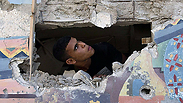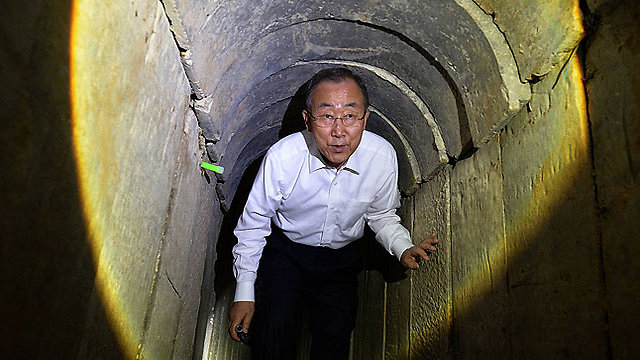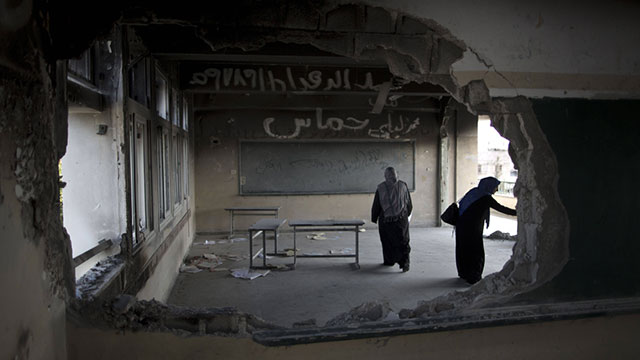
"I deplore the fact that at least 44 Palestinians were killed as a result of Israeli actions and at least 227 injured at United Nations premises being used as emergency shelters," UN Secretary-General Ban Ki-moon wrote in a cover letter accompanying the summary of the inquiry's findings.
"I am dismayed that Palestinian militant groups would put United Nations schools at risk by using them to hide their arms.
"The three schools at which weaponry was found were empty at the time and were not being used as shelters," Ban wrote.
The inquiry also found weak security at the UN schools where weapons were found. It said in two cases that a "Palestinian armed group" likely fired from two of the schools.
In one case, the inquiry says, a UN girls' school was hit by 88 mortar rounds fired by the IDF. In another case, another girls' school was hit by direct fire from the IDF with an anti-tank projectile. A third girls' school was hit by an IDF missile.
On July 30, Israeli strikes tore through the walls of the Jabalia Elementary girls' school, which was crowded with sleeping war refugees. Some 3,000 Gazans had sought refuge there. A series of Israeli artillery shells hit before daybreak. A classroom became a scene of bloodied clothing, bedding and debris. The inquiry says 17 or 18 people were killed, including a UN staff member and two of his sons.
"No prior warning had been given by the government of Israel of the firing of 155 MM high explosive projectiles on, or in the surrounding area of the school," the inquiry said.
A spokesman for the UN agency for Palestinian refugees said in a statement, "The inquiry found that despite numerous notifications to the Israeli army of the precise GPS coordinates of the schools and numerous notifications about the presence of displaced people, in all seven cases investigated by the Board of Inquiry when our schools were hit directly or in the immediate vicinity, the hit was attributable to the IDF."
Spokesman Chris Gunness added, "In none of the schools which were hit directly or in the immediate vicinity, were weapons discovered or fired from."
Both Israel and Hamas, the Islamist group that dominates Gaza, said they would cooperate fully with the inquiry, launched by Ban in October.

The inquiry was headed by Patrick Cammaert, a retired Dutch general and former force commander of the UN peacekeeping mission in eastern Democratic Republic of the Congo.
Israel's military in September opened five criminal investigations into its Gaza war operations, including attacks on some of the UN schools and an incident that killed four Palestinian children on a beach.
In a statement, Foreign Ministry spokesman Emmanuel Nahshon said, "All of the incidents attributed by the report to Israel have already been subject to thorough examinations, and criminal investigations have been launched where relevant. ... Israel makes every effort to avoid harm to sensitive sites."
Nahshon's statement added, "The executive summary of the report clearly documents the exploitation by terrorist organizations of UN facilities in the Gaza Strip."
Palestinian Foreign Minister Riad Malki said, "We will take the report and will present to the International Criminal Court, especially that they are looking these days at our request to do a preliminary study." The Palestinian Authority became a member of the court this month in an effort to pressure Israel..
Malki also praised the UN for releasing the report after a delay, saying he had been worried that Israel was trying to suppress it.
Sami Abu Zuhri, a spokesman for Hamas, the militant Islamic group that rules Gaza, said the UN report was a "clear condemnation" of Israel. On reports that militants used UN schools to store weapons he said: "Hamas has no information about this."
"United Nations premises are inviolable and should be places of safety, particularly in a situation of armed conflict," Ban wrote. "I will work with all concerned and spare no effort to ensure that such incidents will never be repeated."
The UN released its summary of the report but said the full 207-page report is private. The inquiry looked at 10 incidents. Ban's statement stressed that the board of inquiry "does not make legal findings" and was not tasked with addressing the wider issues of the Gaza war.
Ban ordered the inquiry in November after thousands of buildings were destroyed and at least 223 Gaza schools, either run by the UN refugee agency or the Islamic militant group Hamas' government, were hit in the fighting. Weapons caches were found in several UN schools that weren't being used at the time.
When Ban visited Gaza in October, he said the destruction was "beyond description" and "much more serious" than what he witnessed in the Palestinian territory in 2009 in the aftermath of a previous Israel-Hamas war.
Ban said Monday he has established a group of senior managers to look into the inquiry's recommendations.
The 2014 war was the most devastating for Gaza's 1.8 million people, killing more than 2,200 Palestinians, according to UN figures. Seventy-two people were killed on the Israeli side, including 66 soldiers.

















